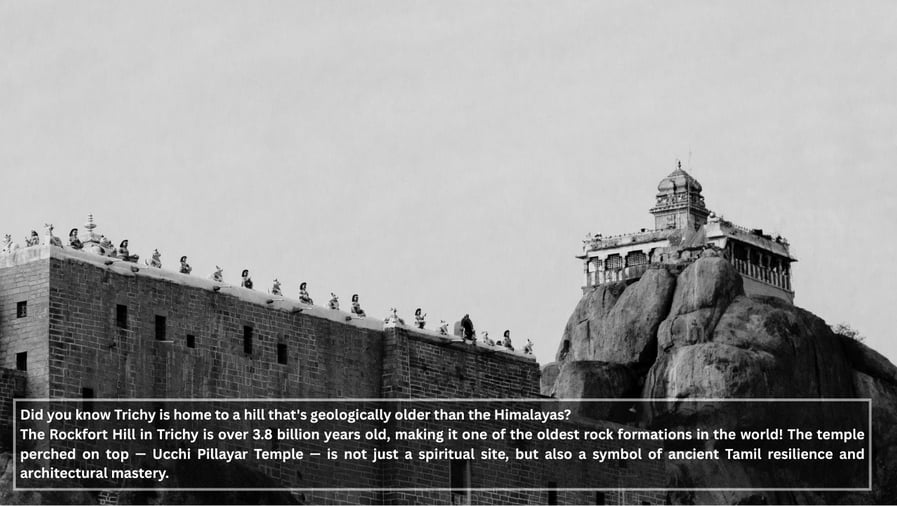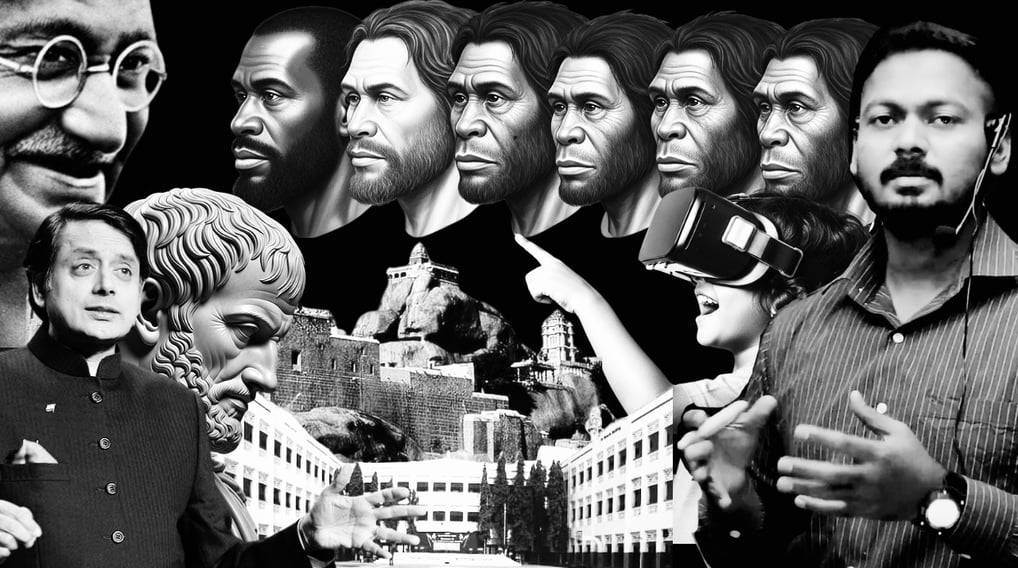My WHY!
Roots of Legacy
I was born and raised in Tiruchirappalli (Tamil Nadu, India), a city with a deep legacy of learning, culture, and historical richness. Known for earliest settlements date back to the Sangam period 300BC.
The city has also given rise to some of the greatest minds India has known:
Sir C.V. Raman, Nobel Laureate in Physics, was born here and started his academic journey
Bharathidasan, revolutionary Tamil poet and social reformer, whose words still shape Tamil identity and education.
Raja Sir Savalai Ramaswami Mudaliar, one of the first Indian philanthropists to contribute to higher education under British rule.
Amidst this backdrop, I spent 12 foundational years at Campion Anglo-Indian Higher Secondary School, estd 1934, Campion is part of the global network of schools run by the Montfort Brothers of St. Gabriel, an order known for its excellence in values-based education across continents. Notably, Dr. Shashi Tharoor, former UN diplomat, bestselling author, and Member of Parliament, is also an alma mater of a Montfort network. “Campion’s tradition of molding leaders from SaaS innovator Girish Mathrubootham to Kargil hero Major Saravanan, it taught me that excellence from entrepreneurship to public service Campionites have excelled in every domain. Campion’s strong Anglo-Indian educational base played a key role in shaping my communication skills, critical thinking, and cultural exposure in becoming a global citizen rooted in values.
Fun,Wires, Realisations
My years at PSG College of Technology were filled with the energy and freedom of college life late night hostel chats, laughter, and friendships that still stay close to my heart. But beyond all the fun, PSG quietly shaped me. It exposed me to the technical world, where logic met innovation, and where I first learned to think in systems and solutions. Toward the end of this phase, a quiet shift happened within me a growing sense that life isn’t just meant to be lived, but understood and shaped with purpose. PSG didn’t just teach me technology it prepared me, unknowingly, for the next chapter of personal transformation that was about to unfold.
Into the Fire: The UPSC Chapter
It was from here standing at the crossroads of youth and purpose that I chose to walk the path of civil services preparation, one of the toughest intellectual and emotional journeys in India. I moved to New Delhi, the heart of the nation, with nothing but ambition in my backpack. I didn’t know the language. I didn’t know the city. But I knew why I was there. Every single day was a battle against uncertainty, self-doubt, isolation, and the weight of expectations. And yet, it became the most defining phase of my life. This was no ordinary academic pursuit I immersed myself in the depths of Indian history, geography, polity, economy, international relations, and yes, Anthropology, one of the most expansive and reflective disciplines I’ve ever encountered. UPSC didn't just demand knowledge it demanded character, clarity, consistency, and most of all, inner strength. It taught me how to think like a policymaker, feel like a citizen, and study like a seeker.
If there's any phase from which I carry the maximum intellectual capital, emotional discipline, and ethical grounding, it is this one. This was my true crucible where comfort was stripped away, but purpose was forged. And I walked away with something just as powerful perspective, resilience, and a lifelong commitment to meaningful impact.
As Virat Kohli once said, “Failures teach you more than success ever can.” I lived that truth. I cleared UPSC Prelims, even reached the Interview stage (Indian Coast Guard), but didn’t make the final cut. And yet, those so-called failures became the most priceless lessons of my life. They taught me resilience, self-awareness, and humility — things no textbook could offer.
Rather than stepping away, I chose to step deeper into the ecosystem. I began mentoring aspirants at Vajiram & Ravi, India’s premier civil services institute — the very place where I had once sat wide-eyed as a student. I evaluated answer scripts, crafted one-word questions, developed crisp content from daily newspapers, and mentored hundreds of aspirants in their own journey of hope and grit. Life had come full circle.
Then came a turning point — the world froze with COVID, and like many, I was forced to pause, reflect, and pivot. With the pressure of finances mounting, and still wanting to stay connected to my UPSC goals, I did what I knew best — serve through knowledge. I created a Telegram community dedicated to Anthropology, opening the doors for honest, peer-driven learning. What began as a small group grew like wildfire — every question answered brought two more members, and within six months, it became a thriving community of 9,000 aspirants.
Curious Case of Anthropology
To manage this wave more effectively, I partnered with Vijetha IAS, one of Delhi’s respected names in Anthropology coaching. It was here I got my first taste of institutional responsibility and my biggest test. One day, almost overnight, I was entrusted with an enormous task: to curate and compile over 300 page Anthropology case studies by scanning two years' worth of news articles, online content all while ensuring everything was precisely aligned to UPSC syllabus relevance.
It wasn’t just research it was back-breaking, soul-deep editorial labour. No shortcuts. No team. Just me, my discipline, and the quiet belief that this content would help others succeed. That effort led to the launch of "Curious" a full-fledged Anthropology publication named by Kishore Sir, the founder of the institute, and chief-edited entirely by me. That phase taught me something invaluable: I wasn’t just a mentor now I had become a builder, a curator of insight, someone who could bring clarity to chaos.
As the world slowly emerged from the grip of COVID, a new door opened for me — one I never imagined walking through. I was offered a position as a full-time faculty for Anthropology from Aram IAS Academy Chennai’s premier institutions. It was a breakthrough, but not without its own inner battles. Coming from Delhi, where Anthropology was largely taught in English, I found myself suddenly in a new cultural and linguistic landscape. I was hesitant. Self-doubt crept in — would I be able to connect with students? Could I match the expectations?
But the only way out was through. I stepped into the digital classroom and pushed my limits — teaching Anthropology full-time, online, delivering 3-hour sessions back-to-back, refining complex concepts into relatable narratives. That’s when I realised: I wasn't just teaching a subject anymore I was building trust, clarity, and confidence one class at a Time to numerous students.
This phase transformed me from a guide into a professional educator. It taught me how to show up every day with purpose, how to handle scale and pressure, and most importantly — how to grow into the very role I once feared.
Lights, Camera, Offline
But life wasn’t done shaping me yet. Due to personal circumstances, I had to shift again — this time to Bangalore, a city unfamiliar in every sense: new streets, new culture, new language. But as fate would have it, another opportunity found me — this time at IAS Baba, one of India’s most reputed UPSC coaching institutes, with a national presence and 5+ centres across the country. Under the mentorship of Mohan Sir, the visionary founder of IAS Baba, I learned the inner workings of a high-scale institution — from operations and pedagogy to the pulse of competitive education in India.
For the first time, I was now offline — standing in front of a packed classroom, teaching Anthropology face-to-face. But little could I have guessed what truly awaited me. I wasn’t walking into a typical batch of students. I was facing a generation that was, in many cases, a decade younger than me, raised in a hyper-digital world, with ChatGPT, Gemini, and Google at their fingertips, silently watching — waiting to fact-check, to challenge, and to be engaged. And that’s when it hit me — I wasn’t dealing with school kids or passive college-goers. I was facing a room full of vigilant, sharp, emotionally aware young men and women, hungry not just for facts, but for meaning, mentorship, and clarity.
The Nexus of Everything
The more I connected with students, the more I realised — this journey was bigger than subjects or syllabi. It was about understanding the psychology of learning, the silent anxiety of aspirants, the FOMO, burnout, and fear that so often accompany competitive exam preparation. I saw behind the masks — and I became not just a teacher, but a mentor, a listener, and in many ways, a mirror. In those moments, I realised: I wasn’t just teaching a subject — I was speaking to a generation. A generation that didn’t just need a teacher, but someone who had walked the walk. Someone who had failed, fought, learned, evolved — and now stood strong, not to instruct but to inspire. That’s when I knew — I wasn’t just meant to be part of the education system. I was meant to change how education feels.
At the same time I stood at the front of packed classrooms, pouring my energy into every session, I couldn’t ignore a subtle shift unfolding before my eyes — an attitudinal evolution among learners. More and more students, even those excelling offline, were beginning to prefer online learning. It wasn’t just about convenience — it was about accessibility, affordability, and autonomy.
This realisation hit me hard: Education was no longer bound to four walls and a timetable. Students today wanted to learn on their terms — from wherever they were, whenever they could. And I knew then that if I truly wanted to create impact, I couldn’t just remain a traditional educator. I had to understand this new wave deeply. That’s when the seed was planted that online education, done right, wasn’t a compromise. It was a revolution. And I wanted to be on the front lines of it.
At that point, I made a conscious decision I signed off the conventional path and decided to retool myself for the future. I enrolled in the “Foundations of EdTech” program at EDHEC Business School, which became a true decluttering experience. For the first time, I could see EdTech not just as a trend, but as a future-proof solution — one that could bring scale, equity, and meaningful engagement into learning.
I launched Exam Alert 247 — a mission-driven initiative shaped by my own decade-long experience. Having witnessed thousands of aspirants pouring their prime years into a single hyper-competitive exam like UPSC — which has a selection rate of less than 0.01% — I knew something had to change. I had been there. I had lived that grind. And I didn't want the next generation to repeat the same mistake of tunnel vision.
Thats the "MISSING LINK", and I had finally found it.
"I’m not just building a brand. I’m building an ecosystem — where students are no longer trapped by the fear of one exam, but empowered with clarity, alternatives, and lifelong growth strategies.”
THIS IS ME
“Built by books, bruises, and breakthroughs I’m the result of every lesson life ever taught me.” I didn’t just survive the system, I’m here to create an impact.”



